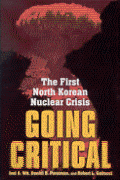The US has begun promoting a “proliferation security initiative” aimed at curbing trade in illicit weaponry—missiles and weapons of mass destruction—worldwide. The plan is to team up with other countries and use their national laws to inspect suspect ships in their territorial waters.
The idea is a good one. While the PSI is no substitute for a comprehensive solution to the problems posed by the North Korean and Iranian nuclear programmes, it could help under some circumstances. But it needs to be pushed further. If the US is smart, it could work through the United Nations to develop even more effective trade curbs for the most dangerous cases.
No scheme short of a complete blockade can ensure that a nuclear weapon’s worth of plutonium will not escape a country’s borders. Indeed, some oppose the PSI because it cannot provide such foolproof protection. But the proper standard for evaluating the PSI should not be quite so demanding. If rogue leaders knew there was a decent chance that their WMD exports would be intercepted—inviting US retaliation—they might be deterred from sending such exports in the first place.
While the initiative may not stop plutonium exports, it could be more successful in intercepting the bulky factory equipment needed to make WMD. And if the PSI is used to intercept drug shipments or missile exports intended to earn hard currency—as Australia has already used it against North Korea—it may squeeze the financial flows underpinning the exporter’s weapons programmes.
But the PSI needs more reach. Stopping ships on the high seas or commercial aircraft not destined for friendly nations will probably require new international legal mechanisms. If the US knew that a given North Korean ship or aircraft was carrying plutonium outside the country, it would simply stop it, justifying the action as self-defence under Article 51 of the UN charter. Since North Korea has recently threatened to export plutonium, since it has a history of exporting weaponry to nasty customers and since the US has been attacked by a terrorist organisation that has a stated desire for nuclear weapons, the legal and political cases would be solid.
But circumstances are seldom so straightforward. What if the US tries to intercept missiles that are not illegal? What if hostile vessels avoid US allies’ waters and it is not clear which ones are carrying dangerous materials? We need a legal mechanism for boarding ships from dangerous countries while they are on the high seas, using force to do so if necessary, and for preventing the uncontrolled overflight of aircraft from these same countries, even if we do not have incontrovertible evidence of dangerous cargoes.
The US should start by asking the UN Security Council to declare North Korea’s plutonium illegal, on the grounds that it was acquired under false pretences. North Korea forswore nuclear weapons in exchange for legitimising its civilian nuclear facilities. It then used those facilities to produce plutonium. A resolution declaring illegal any weapons material so obtained and establishing a low threshold for searches aimed at intercepting it could underpin boardings on the high seas, whether applied to North Korea or some day to Iran.
Other legal moves should be made as well, both to strengthen the case for dealing with North Korea and to help when countries do not withdraw from binding treaties. The US could argue that countries with highly oppressive internal policies or a demonstrated recent sponsorship of terrorism merit special concern. A Security Council resolution would declare that, by behaving illegally in either way, a state would lose much of its sovereign right to protection. Once the Security Council declared a specific state to fall under the resolution, authority for searches of its international cargoes would be automatic.
The North Korean threat could unite the international community in negotiating the kinds of agreements outlined. But even if such agreements cannot be concluded, efforts towards them will still be valuable. UN-based discussion of possible security arrangements can only bolster America’s position if it is ever forced to stop a North Korean ship in self-defence. And its willingness to take a multilateral approach would help repair America’s standing in the world.





Commentary
Op-edA Global Solution Is Needed for Illicit Weapons
July 11, 2003